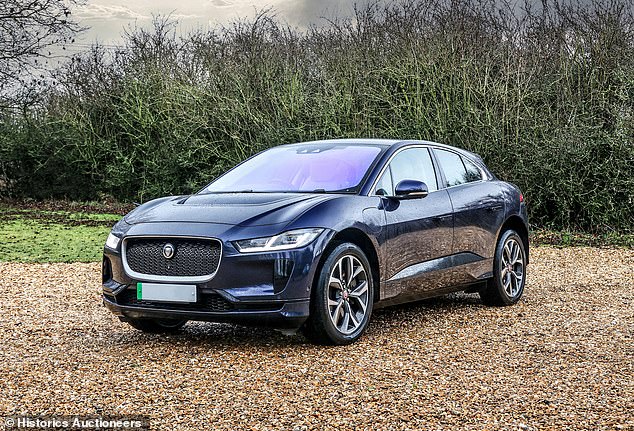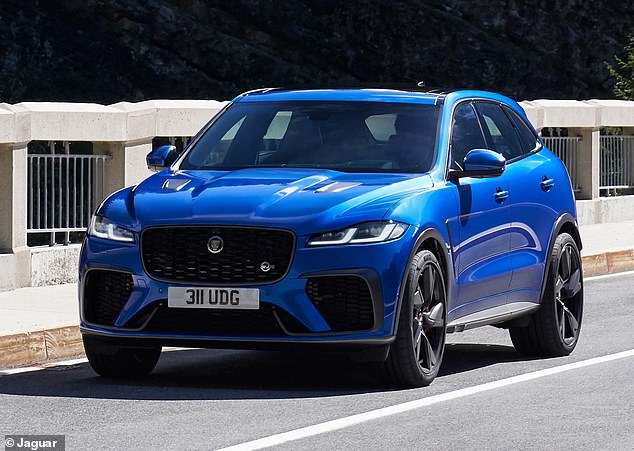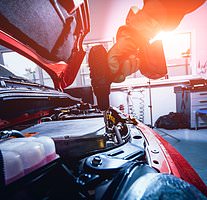Jaguar culls all but ONE model as it axes four petrol and diesel cars and I-Pace in major acceleration to EVs
- Jaguar moving to reposition as an luxury all-electric brand from next year
- Cars being culled offer 'close to zero profitability', CEO says
If you want a new Jaguar in 2024, you will soon only have the choice of a single model.
That's because the British brand - now owned by Indian group Tata - is culling almost its entire existing production car line-up ahead of its 2025 move to all-electric vehicles, with many of its household names being axed.
The Coventry-based manufacturer has announced its removing five models in total, with only one combustion-engine car to survive from Jaguar's current portfolio.
The brand has admitted the soon to be discontinued models offer 'close to zero profitability'.

I-Pace culled: Jaguar's announced its only existing EV is among of five models to be axed this year, before the brand restructures as an electric-only luxury brand. Cumulatively, over 60,000 Jaguar I-Pace were sold globally

The XE saloon is another one for the rejection heap, with the saloon getting the boot by the end of this year

It was announced last year that the F-Type sports car was for the chopping block

The car maker's Castle Bromwich factory (pictured) will stop producing the XE and XF saloons and F-Type sports car this year
The five models to be chopped by parent group JLR (formerly Jaguar Land Rover) are the F-Type sports car, the E-Pace compact SUV, XE midsize saloon, XF premium saloon and the I-Pace electric SUV.
The only model to remain in production is the F-Pace - Jaguar's answer to a large luxury SUV.
JLR had already announced in March that it would stop building saloon and sports cars at it's UK manufacturing sites.
However, the E-Pace and I-Pace are unexpected additions to the chopping block revealed during an investors meeting last month.
Both vehicles are produced by JLR production partner Magna Steyr at its factory in Graz, Austria.

King Charles III's former Jaguar I-Pace. Forever a champion of environmental causes and a known car-enthusiast, King Charles personally purchased this electric car from Jaguar in 2018. That made it the first all-electric car in the royal household
The I-Pace has been JLR's only EV since 2018 and gained recognition for being one of the first mass-produced luxury electric SUVs on the market.
Even King Charles was a fan, personally purchasing a range-topping Jaguar I-Pace EV400 HSE, finished in 'Loire Blue' - the first all-electric car in the royal household.
But the British brand is focusing its efforts on ramping-up on a new breed of EVs as part of its ambitious proposal to become an 'all-electric luxury brand' to rival Tesla from next year.
The Tata Motors owned marque is planning to launch three new all-electric models, all to be built on a Jaguar Electrified Architecture (JEA) platform.
The first new-generation EV is due to be unveiled next year, with a concept car to be debuted in the US this year.

The Jaguar F-Pace is the only SUV and current Jaguar model that is not being axed
As well as an electric repositioning, Jaguar will wield its axe on some models to boost both sales and the selling price of its vehicles.
According to Automotive News Europe, CEO Adrian Mardell told investors on 19 June: 'We are eliminating five products, all lower value.
'None of those are vehicles on which we made any money, so we are replacing them with new vehicles on newly designed architectures.'
Mardell said that, by axing the five models, JLR will increase the average selling price of its products.
Already JLR has an average selling price for its models of £70,000.
Recently, JLR's financial success has come from its 'big three' high-profit models, the Range Rover, Range Rover Sport and Land Rover Defender.
These three models accounted for 59 per cent of the brand's 111,180-unit retail sales globally for the three months to the end of June.
Overall, the three luxury vehicles contributed 85 per cent of JLR's 'value', Mardell reported.
He said Jaguar's 'going to lose products, but they are not the rich ones'.
Jaguar sold just 15,324 cars between April and June, compared to 95,856 for Land Rover.

JLR has already released images of its new electric Range Rover, which is due to be revealed shortly
The three new Jaguar electric models are due to be joined by a trio of electric Land Rover products.
The first Land Rover EV will be the much anticipated full-electric version of the Range Rover.
The Range Rover EV is expected to cost at least £130,000 and go up to £200,000 for higher-end versions.
Automotive News Europe also reports that JLR informed investors it's looking to increase sales of high-value, special edition models more than £1.5million in a new 'halo strategy' push.
A JLR spokesperson told This is Money in March: 'As JLR transitions to its electric future, current Jaguar production at our Castle Bromwich site will come to an end in June 2024.
'Jaguar will begin an exciting new era as a pure-electric modern luxury brand with production commencing at our Solihull facility from 2025.'


































































